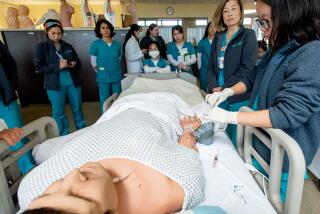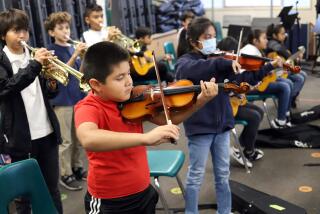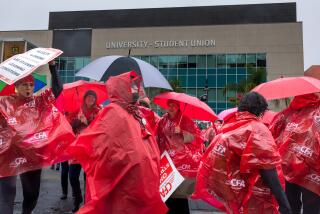Pay Proposal Targets Some Part-Time College Instructors
SACRAMENTO — An experimental program to increase salaries for underpaid, part-time “freeway fliers” who teach at several community colleges was approved Monday by the system’s state advisory board.
A $2-million pilot program, if approved by the Legislature and Gov. Gray Davis, would allow six colleges to hire five full-time, tenure-track instructors each. It also would let them teach courses at neighboring colleges.
The plan is part of a larger state system proposal “to see if we can offer full-time opportunities to enable people to come off the freeways,” said Tom Nussbaum, state chancellor.
“I think this is really very exciting,” said Chris Storer, a philosophy instructor at DeAnza College in Cupertino and executive council chairman of the California Part-Time Faculty Assn.
The state system’s proposed 2001-2002 budget, approved by the board and presented to the Democratic governor, also contains $75 million for the first year of a three-year program to bring part-time instructors’ salaries closer to those of full-time faculty.
Most colleges and universities rely on part-time instructors, who do not have tenure rights and frequently are paid less with fewer benefits, to give them flexibility as enrollments change.
However, the use of part-timers is particularly acute in California’s community college system, the largest in the nation. It serves 1.5 million students in 107 colleges run by 72 locally elected districts.
About 31,000 of the statewide community college faculty, or 34%, are part-timers. Some of them want to teach part time, but thousands want full-time jobs. Many, therefore, end up teaching courses in several nearby districts to piece together a living. They call themselves “freeway fliers” because they spend so much time commuting among colleges.
While pay scales vary among districts, the part-timers generally make much less than their full-time counterparts who do the same work. The statewide average hourly rate for full-time faculty in 1998 was $112.94, while for part-timers it was $40.84, according to the chancellor’s office.
Most part-timers also did not have health benefits and were not paid for holding office hours until the Legislature provided money for that two years ago.
“The hopes really of the entire higher education community in the United States are looking to California and what the community college system is doing,” Storer said.
“Everybody has come finally to the recognition that something has to be done. California has a chance to be out in front,” he said.
Students will gain from the proposals by having more contact with faculty, said Judith Michaels of the California Federation of Teachers.
Under the pilot proposal, the six districts chosen would create new, full-time faculty positions, five for each college. Those instructors would teach not only at their home college but also at nearby colleges.
The instructors would get the same salary and fringe benefits as other full-time faculty. The home college and the neighboring colleges would continue to pay those instructors at their existing part-time rates, with the state making up the difference.
The cost would be $2 million a year for four years. During that time, the state would study the program to see how well it worked.
The California Community Colleges Board of Trustees unanimously approved the proposal Monday.
In the past two years, faculty groups and the board have proposed money to increase part-timers’ salaries, but Davis has blocked or vetoed those proposals.
The governor has said he was waiting for a study that was included in a 1999 bill on the differences between salaries for part-time and full-time faculty. That study by the California Postsecondary Education Commission was supposed to be finished last spring, but it is not scheduled to be done until next March.
The $75 million to increase part-timers’ salaries is part of a budget proposal by the chancellor’s office. It would be $930 million higher than this year’s $2.7-billion budget.
That increase is the largest the chancellor’s office has ever proposed, Nussbaum said. It is designed to “help us catch up for long periods of underfunding.”
More to Read
Sign up for Essential California
The most important California stories and recommendations in your inbox every morning.
You may occasionally receive promotional content from the Los Angeles Times.










